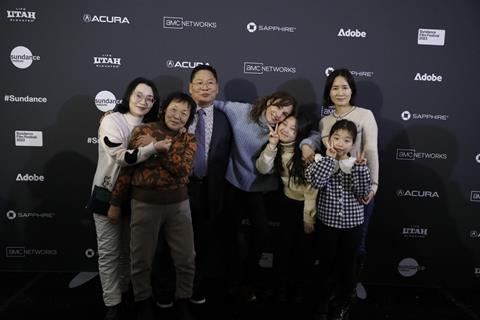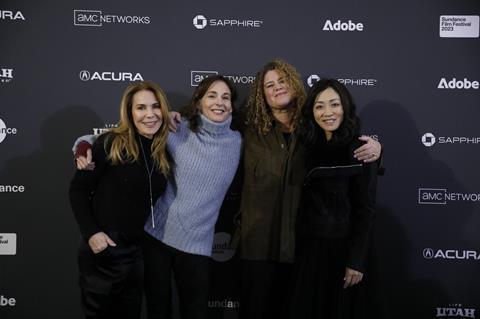
Beyond Utopia, Madeleine Gavin’s documentary about people attempting to escape North Korea, is making its international premiere in the F:act strand at CPH:DOX in Copenhagen this month.
Having won the audience award in the US documentary section at Sundance in January, the filmmakers are hopeful the film can change the focus around the secretive state. “I’m excited by the idea that because this has never been done before, there’s a chance it could do something that’s now also never been done,” says Gavin.
It began as a different story, when Jana Edelbaum of New York production outfit iDeal Partners Film Fund presented Gavin with The Girl With Seven Names, a 2014 memoir by North Korean defector and activist Hyeon-seo Lee. “I said, ‘I don’t know that I’m the right person [to adapt it] because I don’t have a personal connection.’ And I knew I didn’t want to make a biopic,” recalls Gavin. But the producers encouraged Gavin to do her own research.
“I saw that nobody had done something that cracked open the world of North Korea, where I really felt the people,” says the director. “When I went deep into North Korean propaganda, it was more shocking than ever. At a certain point, I thought ‘this movie has to be made’.”
Beyond Utopia follows three key threads: the efforts of the Roh family to escape their country and make it through several other nations to one where they are free; Soyeon Lee, a defector living in Seoul, South Korea who attempts to bring her 17-year-old son to safety; and Seungeun Kim, a South Korean pastor who has made it his life’s work to help North Koreans escape the oppressive state. Filming took place in 2019, before the pandemic shut down the already-limited routes out of the country; although efforts are now underway from Kim and others to resurrect those pathways.
Following the Sundance win, and after interest from two major streamers during the festival, Dogwoof snapped up world sales rights in February.
Protective
Securing Kim’s support for the film was key to telling the defectors’ stories. The pastor had been “approached by many different groups” in the past including the BBC, but had never agreed to a study of this nature. “He’s so protective of his network,” says Gavin. So what did the Beyond Utopia team do differently? “It’s not what we say; it’s time and being true to your word,” says producer Rachel Cohen of iDeal. “Doing what we said we were going to do.”
Parts of the film, including the Roh family escaping through the Chinese jungle, play out like a thriller; while it also includes covertly-recorded footage of life in the authoritarian state of North Korea. With none of the US team nor Kim able to enter either country, the production relied on Kim’s network of “incredibly brave North Koreans who want the story of their country to get out,” says Gavin. For footage in unwelcoming neighbouring countries, they used a series of cameras Kim keeps hidden across his network of brokers, who facilitate the defections.
The pastor would make a top-drawer filmmaker, says Gavin. “He’s such a great line producer – there are 50 brokers involved,” she notes. “He would say things on the phone like, ‘I’m sure you want to capture the moment when…’. He was a total production manager.”

Gavin and Cohen had first met the Rohs in Laos, after they had made it through China and Vietnam; it was the first time the family had met any westerners.
Having been brought up to believe that all such people were evil – as the film notes, the North Korean term for Americans translates literally as ‘American bastards’ – the Roh grandmother was surprised the filmmakers were so kind. “She couldn’t believe it, it was just such a cognitive dissonance for her,” says Cohen. “But she was so warm.”
Brutal
Making a film about North Korea brings unique challenges – especially in light of Evan Goldberg’s 2014 comedy The Interview. Its satirical depiction of North Korean leader Kim Jong-un led to a cybercrime group hacking Sony computers, and threatening terrorist attacks against cinemas which showed the film.
Gavin and Cohen don’t have those concerns around Beyond Utopia. “He’s going to love it,” says Cohen of what Kim Jong-un’s response might be. “He’s depicted as brutal – that happens in the news every day,” adds Gavin. “The idea of him being a strong man – he likes that.”
Still, the production has done its due diligence around potential pushback. “We have had guidance from people who are much smarter about this than we are,” says Cohen. “They’re quite dismissive of there being any retaliation for this. The Sony hack was a very specific parody – shove a missile up his ass and kill him. So people extrapolate that’s what it’s going to be.”
The years of 2020 through 2022 were spent in meticulous post-production – “a long, circuitous journey that took a lot out of us,” says Cohen. “Madeleine more than anyone – I’ve never seen anyone work as hard to finish the movie for Sundance.” Spoiler alert: That premiere provided an “incredibly gratifying” experience says Cohen, with the Roh family, Lee and Kim all in attendance.
“We’re so grateful, because even for films that deserve it, you don’t always get it,” says Gavin of the reaction. “The idea that this could possibly help in any way to affect change – that to me is the main thing. It’s a daunting task, but we have to do right by our subjects.”

























No comments yet